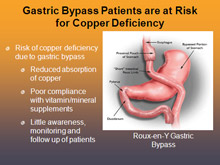November 10, 2010
FOR IMMEDIATE RELEASE
Improper Checkups Can Lead to Severe Copper Deficiency in Gastric Bypass Patients
NEW YORK, NY— In the early 1990s, approximately 16,000 people had bariatric surgery in the United States. In 2008, it was estimated that the number of people who had undergone the procedure had climbed to 220,000, according to the American Society for Metabolic and Bariatric Surgery (ASMBS). With obesity rates on the rise, this type of surgery is likely to become more common in years to come.
Bariatric surgery is a general term that refers to any type of weight loss surgery. These procedures are viewed as a last resort for people who are obese, at least 100 lbs. over their ideal body weight, and need to lose a significant amount of weight for health purposes.
One of the most well-known procedures of this type is gastric bypass surgery, which makes the stomach smaller and allows food to bypass part of the small intestine. The operation tricks the patient into feeling full with less food than when their stomach was its original size.
While gastric bypass surgery can cause rapid and dramatic weight loss, there are drawbacks. After bypassing the small intestine, food moves directly to the lower intestine which does not absorb nutrients as well as the upper part of the digestive tract. The patient eats less and derives less nutrition from the food that is consumed. Less fat is absorbed by the body, but along with that benefit, fewer essential nutrients and vitamins are absorbed.
"Typically what happens is people get really excited about the weight loss, and feel healthier to the point where they feel that they don't need to go in for their routine checkups," said Nana Gletsu Miller, Ph.D., an assistant professor at the School of Public Health at Emory University. "Less than 20 percent get routinely checked after surgery, and this is what leads to complications."
Gletsu and her colleagues at Emory tracked the health of 155 patients who underwent gastric bypass surgery in 1999. The study found that 12 percent of the subjects displayed a severe deficiency in copper, an essential nutrient found in meats, nuts, shellfish, leafy greens and other common foods that are incorporated in a healthy diet.
For healthy individuals eating a normal diet, copper deficiency does generally not develop. But, after surgery like gastric bypass, copper supply can become critical. This is an even more serious issue, as copper deficiency is not easy to detect.
"The problem is that blood tests won't necessarily reveal anything about a person's copper levels," Gletsu Miller said. "But with our tests, all nutrient levels were so low (after the surgery), that we were able to see the copper levels drop, and then detected the ensuing complications, like neurological issues, trouble walking, tingling in fingertips and numbness."
By detecting copper deficiency early, the problems can be treated. Early symptoms that can be addressed are anemia and neutropenia (failure of the bone marrow to make enough white blood cells).
"Mild or beginning copper deficiency is extremely hard to diagnose," said Ruth Danzeisen, Ph.D., Assistant Program Director for Health, Health and Environment Program for the International Copper Association (ICA). "Blood copper levels often do not mirror the body's copper status, especially in the early stages of a deficiency. By the time blood copper drops, the deficiency is already quite severe. Because copper deficiency resembles many other conditions, such as iron- or Vitamin B12 deficiency, doctors generally run tests for several conditions before they diagnose a copper deficiency simply by excluding all other possibilities. Another complication is that once a patient is diagnosed as copper deficient after surgery, it is extremely difficult for them to absorb copper just from eating a healthy diet."
There are currently tests being performed to identify different biomarkers, which include types of proteins that copper attaches to that can indicate copper deficiency much earlier and more easily.
To prevent post-operative complications, Gletsu Miller has a few tips for anybody who undergoes gastric bypass surgery.
First, a patient should get routine checkups after the surgery. As previously mentioned, less than 20 percent of patients continue with their checkups six months after they undergo the surgery.
The second piece of advice is to take vitamins and minerals daily, making sure that the supplements include copper as an ingredient. As with checkups, many patients stop taking vitamin and mineral supplements months after the surgery because they feel healthy, but it is important not to fall into this trap.
Lastly, be aware of the warning signs and symptoms of copper deficiency. If blood work shows anemia while already taking vitamins and minerals, request to get tested for copper deficiency.
The true advice to staying healthy after gastric bypass is self-awareness, and not ignoring symptoms.
"You might begin to see an iron deficiency within the first year if it's occurring, but copper can take much longer," Gletsu Miller said. "It might take up to two or three years until you've gone long enough without good absorption of copper, but it depends on the person's health heading into the surgery."
While the early stages of copper deficiency can be treated relatively easily, it becomes more difficult to correct with time.
"Blood cell production can be improved, but neurological damage can be permanent," Gletsu Miller said.
The worst case scenario of copper deficiency can be irreversible paralysis, says Gletsu Miller, who has seen several of these cases. It is important for patients to maintain a healthy diet after gastric bypass surgery, take health supplements and see their doctor regularly.
###

 Information provided by Nana Gletsu, Ph.D.
Information provided by Nana Gletsu, Ph.D.